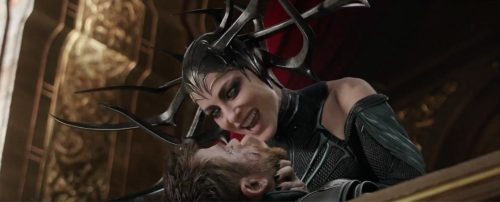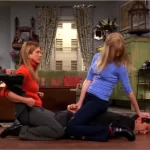Thor: Ragnarok: The Second-Best Film with Both Jeff Goldblum and Sam Neill In It, by Ian Brill
Most of the Marvel Cinematic Universe heroes are marked by tragedy and internal struggle. Tony Stark uses snark to hide guilt and post-traumatic stress disorder. Steve Rogers is a man out of time. But Thor? Thor’s a good-looking prince who runs headlong into battle for the fun of it. He had to learn humility in his first film, and he did, but not enough to dent his hail-fellow-well-met attitude. Now with absence of his star-crossed love, Natalie Portman’s Jane Foster, Thor doesn’t have any longing to drive him. So what does director Taika Waititi do? He makes Thor funny, and Thor: Ragnarok is more enthusiastic about delivering laughs than any other MCU film, which already tend to have some jibes in them. But since other characters in Thor’s orbit struggle with their own demons, included Bruce Banner/Hulk, arguably Marvel’s most tragic hero, we never quite forget what we’re missing, and the overall effect can leave one feeling like something’s lacking, even in a film with a lot of good going for it.
The story does deal Thor a heavy blow. He loses Asgard to a sister he never knew he had, Hela. Played by Cate Blanchett with devilish deliciousness, this new villain banishes Thor and Tom Hiddleston’s Loki from their home. She even destroys Thor’s trusty hammer, Mjolnir. But before this happens, Thor and Loki suffer a more personal lost. Their father, Anthony Hopkins’ Odin, dies soon after warning them of the coming Ragnarok. This loss is the emotional basis of the film, and it’s the film’s major weak point. Centering the most serious scenes on Hopkins is a mistake, as the actor never gave his best work as the King of Asgard. There’s a laziness to his performance. Notice how every other actor playing Asgardians, whether they hail from Australia, New Zealand, or the U.S., speak in an English accent, usually in received pronunciation. But Hopkins, who is meant to rule over Asgard and set a certain standard, never bothers to drop his native Welsh accent. His presence is analogues to Marlon Brando’s in the 1978 Superman, a major actor who spends a few days on set half-awake and is probably paid a bundle for it, all to give the film a quick sense of legitimacy. It was a bad idea in 2011’s Thor, and now the sequels are stuck with it.
Thankfully, the film livens up when Thor and Loki end up on Sakaar, a junkyard of a planet run by Jeff Goldblum’s Grandmaster. If Blanchett’s villain is a bit camp in her fierceness. Goldblum is in full latter-day Christopher Walken mode in this performance, playing a “meme” version of his public persona, complete with all the ticks and stutter. It could be cloying but Waititi’s Sakaar is perfectly over-the-top and Goldblum as a ruler sets the tone for his world.
The scenes on Sakaar show that Waititi took the right lessons from James Gunn’s Guardians of the Galaxy films. We have a character in a strange land, and to ease us in, the film hits a comedic tone. Hemsworth was the funniest thing in the Ghostbusters remake and he continues to display his comedy chops here. He excels at playing characters with no self-awareness yet as a performer, he possesses an acute awareness for comic timing and delivery. It’s the kind of balancing act many handsome leading men go for but can’t pull off, but he can with aplomb.
The other notable aspect of the Sakaar setting is that it’s a great tribute to Jack Kirby. Kirby is the artist who co-created most of the Marvel Universe with Stan Lee, and up until know the MCU has forgotten his influence. But Sakaar captures the spirit of Kirby’s artwork with its asymmetrical patterns, colorful creatures and regal costumes that protrude jagged extremities. Some of Kirby’s own art appears in the background of certain settings. To see a Marvel film that celebrates Kirby’s outrageous and mind-bending artwork makes this film special. It’s only appropriate that we are then reintroduced to one of Kirby’s greatest co-creations, The Incredible Hulk.
Thor and Hulk are reunited on Sakaar, first as rivals in the Grandmaster’s arena matches and then as roommates (it’s never really explained why they share a living quarter – in fact, this is a film where characters often show up in places just when they are needed with little rhyme or reason). This Hulk is more talkative than any other version we’ve seen, and his caveman-like cadence should be familiar to comic book fans. The two become a comic duo, almost a sci-fi Hope & Crosby, but matters soon become a bit more serious when Hulk reverts to Mark Ruffalo’s Bruce Banner.
Banner is facing a dire problem with his Hulk self and while I won’t spoil it here, it’s an intriguing premise. But the film doesn’t scene the premise through, even after Banner makes a dangerous, albeit heroic choice. Same with Tessa Thompson’s Valkyrie. A disgraced hero who balms her pain with drinking, she has a journey that could be fascinating, if the film bothered to see it through.
Like Guardians of the Galaxy, Ragnarok has a group of pained outcasts team up to win the day. But since Ragnarok is centered on Thor, the supporting players’ pain is swept to the sidelines. The result is a film that delivers amazing visuals and great laughs but feels slight and forgettable as soon as it’s finished.































I don’t think I could distinguish a Welsh accent from an English one.